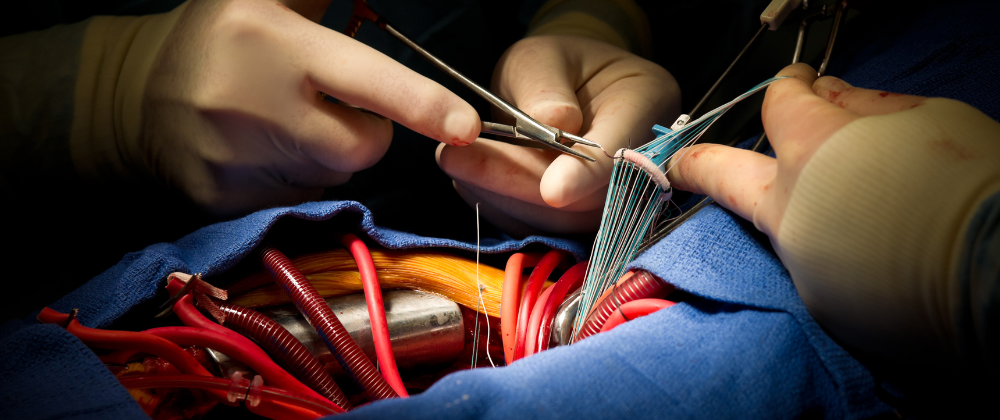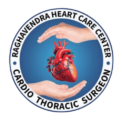Double Valve Replacement
Appointment Form

Dr. Raghavendra Murthy
MBBS, MS - General Surgery, MCh - Cardio Thoracic and Vascular Surgeron

Best Double Valve Replacement Surgery in Bangalore
Double Valve Replacement Surgery is a vital procedure for patients with severe heart valve issues, particularly those affecting both the mitral and aortic valves. This surgery aims to restore normal heart function, significantly improving patients’ overall health and quality of life. For patients in need of Double Valve Replacement Surgery in Bangalore, accessing advanced treatment options and experienced cardiac specialists, such as Dr. Raghavendra Murthy, is essential. Bangalore’s leading hospitals offer innovative surgical options for heart valve replacement to improve patient outcomes and quality of life. This procedure is especially beneficial for patients dealing with complications from both mitral valve replacement and aortic valve replacement, enabling effective management of aortic valve stenosis treatment and other heart conditions.
With experienced heart valve surgeon like Dr. Raghavendra Murthy and Advanced facilities, Double Valve Replacement Surgery in Bangalore has become a preferred choice for addressing intricate heart conditions, including those requiring valve replacement due to congestive heart failure. Top hospitals in Bangalore focus on minimally invasive heart valve replacement techniques, which aim to shorten recovery times and enhance surgical outcomes for patients facing complex valve issues. This commitment to advanced care ensures that patients receive effective treatment personalised to their specific needs.
What is Double Valve Replacement Surgery?
Double Valve Replacement Surgery is a critical cardiac procedure involving the replacement of both the mitral and aortic heart valves to restore normal blood flow and alleviate symptoms related to severe valve disease. This surgery is particularly beneficial for patients with advanced heart valve disease, where compromised heart function arises from valve-related complications. Patients often experience significant improvements in their quality of life following the surgery. In Bangalore, options such as Double Heart Valve Replacement Surgery and minimally invasive aortic valve replacement offer advanced solutions personalised for those requiring comprehensive heart care. These procedures not only enhance heart function but also minimize recovery time, making them suitable for a broad spectrum of patients with complex cardiac conditions.
Symptoms of Double Valve Replacement Surgery
Patients may require Double Valve Replacement Surgery when experiencing symptoms such as:
- Shortness of breath: Difficulty in breathing during activities or even at rest.
- Chest pain or discomfort: Pain in the chest that may indicate heart strain.
- Fatigue and weakness: Unusual tiredness that impacts daily activities.
- Heart palpitations or irregular heartbeat: Awareness of the heart beating too fast, slow, or irregularly.
Recognizing these symptoms early and consulting with a qualified heart valve specialist can significantly enhance treatment outcomes and overall well-being, especially for those considering Double Valve Replacement Surgery in Bangalore. Early intervention is key in managing heart valve conditions effectively and improving the likelihood of successful surgery.
Causes of Double Valve Replacement Surgery
- Aortic Valve Stenosis: A narrowing of the aortic valve that restricts blood flow, leading to increased pressure on the heart.
- Congenital Heart Defects: Structural heart issues present at birth that can affect normal heart function and may require surgical intervention.
- Degenerative Diseases: Conditions that deteriorate the mitral and aortic valves over time, affecting their ability to function properly.
- Heart Valve Disease: A range of disorders that impact the valves' ability to open and close effectively, potentially leading to heart failure.
- Infections: Endocarditis and other infections can damage heart valves, necessitating repair or replacement procedures.
- Other Conditions: Heart valve regurgitation and atrial fibrillation may also lead to the need for Double Valve Replacement Surgery to restore optimal heart function.
These causes highlight the importance of early detection and consultation with experienced specialists, particularly in centers offering Double Valve Replacement Surgery in Bangalore.
Risk Factors for Double Valve Replacement Surgery
Common risk factors for requiring Double Valve Replacement Surgery include:
- Aging and Family History of Heart Disease: Older age increases the likelihood of valve degeneration, and a family history of heart conditions can heighten risk.
- High Blood Pressure and Cholesterol Levels: These conditions can exacerbate existing heart problems, leading to valve disease.
- Congenital Heart Defects or Previous Heart Surgeries: A history of congenital heart issues or prior cardiac surgeries can predispose individuals to develop heart valve problems.
Understanding these risk factors is crucial for early detection and management. For those in need of Double Valve Replacement Surgery in Bangalore, consulting with experienced cardiac specialists can lead to effective treatment options and improved outcomes.
Complications of Double Valve Replacement Surgery
Potential complications associated with Double Valve Replacement Surgery may include:
- Heart Failure: The heart may struggle to pump effectively after surgery, particularly in patients with underlying conditions.
- Arrhythmias: Irregular heartbeats can occur postoperatively, which may require further management.
- Infections: While rare, infections can develop following valve replacement procedures, necessitating prompt medical attention.
Despite these risks, with proper medical guidance and early intervention, Double Valve Replacement Surgery in Bangalore is generally considered safe and effective. Consulting with an experienced heart valve surgeon can provide peace of mind regarding these potential complications.
Preventative Measures for Double Valve Replacement Surgery
For patients with a family history of heart conditions, the following preventative measures are recommended:
- Regular Cardiology Check-Ups: Routine examinations can help detect heart issues early, ensuring timely interventions.
- Maintaining a Healthy Lifestyle: Adopting a balanced diet and regular exercise can significantly contribute to overall heart health.
- Monitoring Cholesterol and Blood Pressure Levels: Keeping track of these vital health indicators can aid in the early detection and management of heart conditions, potentially reducing the need for surgical intervention.
By implementing these measures, individuals can proactively manage their heart health and potentially minimize risks associated with heart valve diseases. For those requiring Double Valve Replacement Surgery in Bangalore, early intervention and regular check-ups are vital for achieving optimal outcomes.
Associated Conditions with Double Valve Replacement Surgery
Conditions frequently associated with Double Valve Replacement Surgery include:
- Congestive Heart Failure: This condition arises when the heart struggles to pump blood effectively, often requiring surgical intervention such as double valve repair or replacement.
- Atrial Fibrillation: An irregular heartbeat that can lead to serious complications if left untreated and may necessitate additional procedures.
- Heart Valve Regurgitation: A condition where blood leaks backward through the valves, often necessitating valve repair or replacement.
These associated conditions underscore the importance of timely intervention and the role of Double Valve Replacement Surgery in Bangalore to restore optimal heart function and improve overall patient outcomes. This highlights the necessity of consulting with specialized cardiac surgeons and accessing advanced treatment options to ensure comprehensive heart care.
Screening Methods for Double Valve Replacement Surgery
Screening for ventricular septal defects involves several diagnostic methods to assess the defect, including:
- Echocardiograms: These ultrasound tests evaluate valve function and heart structure, providing essential information on how well the heart is pumping blood and the condition of the valves.
- Electrocardiograms (ECG): This test records the electrical activity of the heart, helping to detect irregular heartbeats or arrhythmias that may indicate underlying valve issues.
- CT Scans: These imaging tests offer precise visualization of the heart's anatomy, allowing specialists to examine the heart valves in detail and assess any abnormalities.
Early detection of heart valve problems is crucial for ensuring the most effective treatment options, including Double Valve Replacement Surgery in Bangalore.
Diagnosis and Tests for Double Valve Replacement Surgery
The diagnosis process for patients needing Double Valve Replacement Surgery includes:
- Comprehensive Medical History Review: Understanding the patient's health background is vital for identifying risk factors related to valve disease.
- Physical Examination: Conducted by a cardiac valve replacement specialist, this examination helps identify symptoms and assess overall heart function.
- Echocardiography and Stress Tests: These tests gauge the severity of valve dysfunction and measure the heart's response to physical stress.
Accurate diagnosis is vital for determining if Double Valve Replacement Surgery in Bangalore is the appropriate choice for treatment. By employing advanced screening methods and comprehensive assessments, healthcare providers can create tailored treatment plans to improve patient outcomes.
Treatment Options for Double Valve Replacement Surgery
When considering Double Valve Replacement Surgery, patients have several treatment options personalised to their specific needs and medical conditions. Here are the primary treatment approaches:
This traditional method involves a large incision in the chest to access the heart. Surgeons replace both the mitral and aortic valves through this approach, making it suitable for patients with complex valve issues.
This technique uses smaller incisions and specialized instruments to replace heart valves. It often results in shorter recovery times and less postoperative pain, making it an attractive option for many patients.
TAVR is a less invasive procedure primarily for aortic valve replacement. It involves inserting a new valve via a catheter, typically through the femoral artery, which may be an option for patients who are high-risk for open surgery.
In some cases, rather than full replacement, surgeons may be able to repair the existing valves. This can preserve heart function and is generally associated with a shorter recovery period.
These treatment options provide a comprehensive range of choices for patients seeking Double Valve Replacement Surgery in Bangalore. The selection of the appropriate approach depends on individual health status, the complexity of the valve disease, and recommendations from experienced cardiac specialists. By exploring these options, patients can achieve improved heart function and quality of life.
Conclusion
Effectively managing hypertrophic obstructive cardiomyopathy through Double Valve Replacement Surgery is essential for enhancing patient outcomes and overall heart health. With highly skilled cardiac professionals and advanced facilities, Double Valve Replacement Surgery in Bangalore offers a range of options designed to prioritize patient well-being. This approach not only facilitates better management of complex heart conditions but also significantly improves the quality of life for those affected. Emphasizing advanced surgical techniques and personalized care ensures that patients receive the best possible treatment to their unique needs.
Frequently Asked Questions
Patients may require this surgery due to conditions such as aortic valve stenosis, mitral valve disease, congenital heart defects, or degenerative diseases affecting the heart valves. These conditions can lead to serious complications and a decline in heart function.
The surgery can be performed through traditional open-heart surgery or via minimally invasive techniques, depending on the patient’s condition and the surgeon’s expertise. The choice of method is made to optimize recovery and outcomes.
The surgery is typically performed by a specialized cardiac surgeon with experience in heart valve procedures.
Preparation may include pre-surgical tests, discussions with your healthcare team, and making arrangements for post-surgery care.
Common tests include echocardiograms, electrocardiograms (ECG), and stress tests to assess heart function and valve severity.
